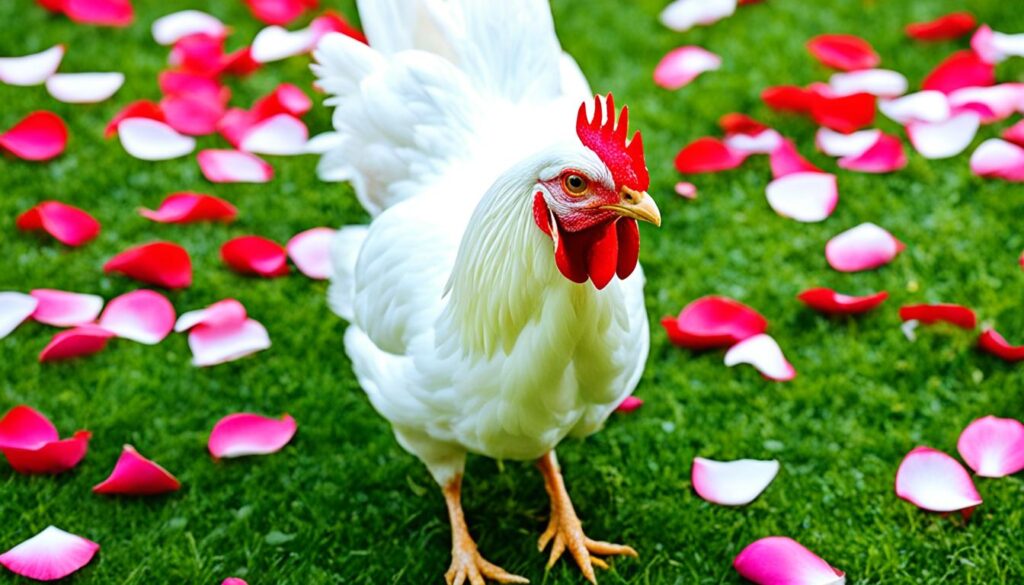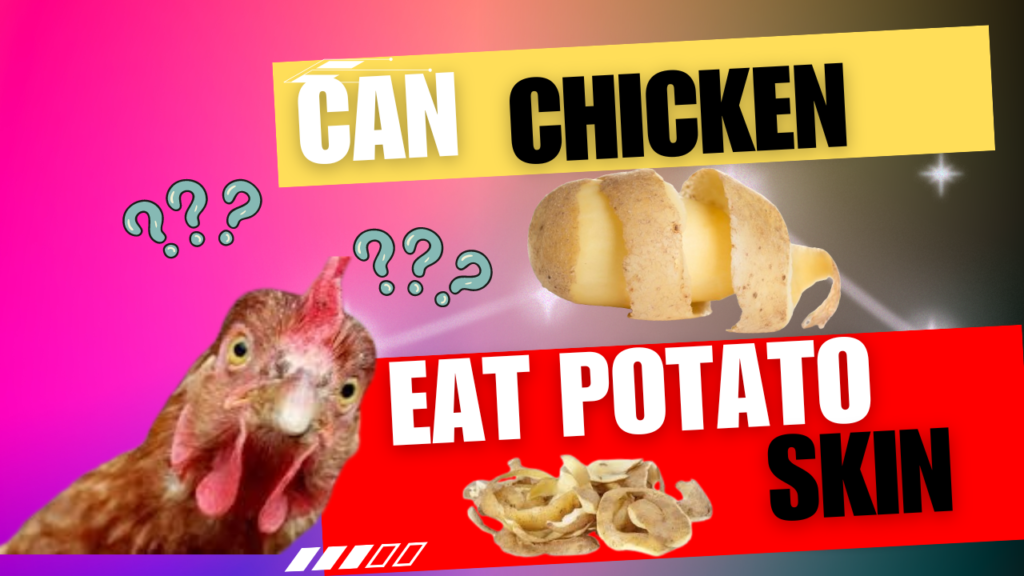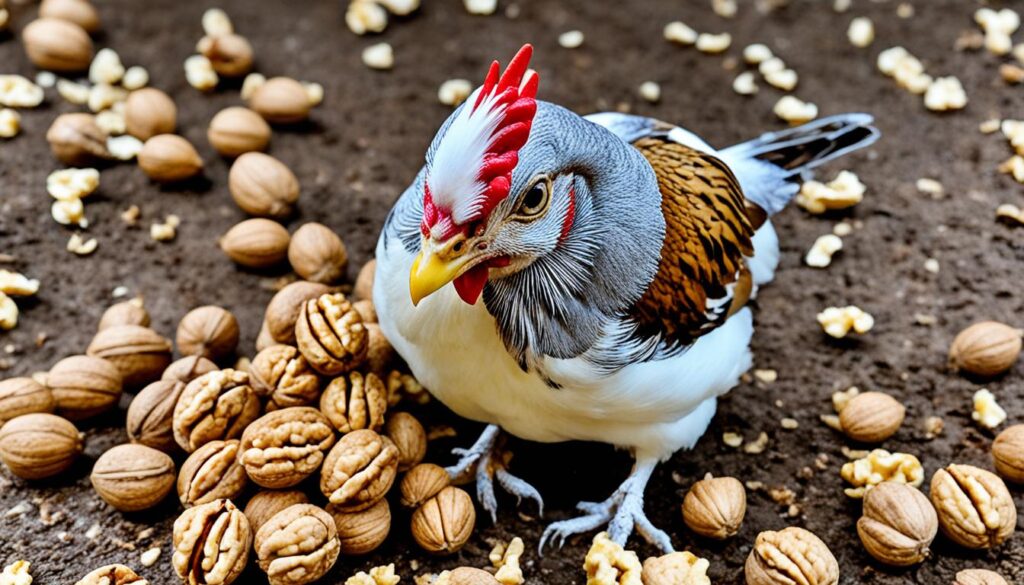A mother hen will often choose rose petals to feed her chicks. This shows how giving your backyard chickens safe treats like rose plants can be good for them. While layer feed is key, adding certain flowers and herbs can boost their health and egg laying.
Chickens love to forage for many things like weeds, seeds, fruits, and even bugs. Knowing which plants are safe lets you give them healthy, natural treats. This meets their natural foraging habits and their nutritional needs.
Key Takeaways
- Chickens can safely eat rose petals, which are full of vitamins A, C, E, and Niacin.
- Rose hips are packed with vitamin C and antioxidants, great for chickens’ health.
- Dried rose petals can be mixed with other herbs and flowers as a nutritious treat.
- Fragrant rose petals can be put in hens’ nesting boxes for a calming environment.
- Offering a varied diet with safe, natural treats helps your chickens stay healthy and boosts egg production.
Benefits of Feeding Rose Hips to Chickens
Rose hips are small, red or orange fruits left on the rose plant after the petals fall. They are a superfood for your chickens. These fruits are full of vitamins and minerals that help your chicken’s health, especially in winter.
Rich Source of Vitamin C and Antioxidants
Rose hips have a lot of vitamin C, more than an orange. This vitamin supports your chickens’ immune system and keeps them healthy. They also have antioxidants that fight oxidative stress and inflammation in your flock.
Boosts Immune System During Cold Weather
When it gets cold, your chickens’ immune system might not work as well. Rose hips can help. They have a lot of vitamin C and antioxidants. These can boost your chickens’ immune system and keep them healthy in winter. Studies show that adding rose hips to their feed can also make them more efficient when it’s cold.
“Rose hips are a true superfood for your feathered friends, packed with essential vitamins and minerals that can greatly benefit your chicken’s health, especially during the cold winter months.”
Selecting and Preparing Rose Hips for Chickens
Choosing the right rose variety is key when feeding rose hips to your chickens. The Rosa rugosa (wild, beach, or Japanese rose) and the Rosa canina (dog rose) are top choices. These wild roses have large, rounded hips that chickens love.
Choosing the Right Rose Varieties
For the last 50 years, roses have mainly been grown for looks, not for eating. So, the Rosa rugosa and Rosa canina are great for chickens. They produce hips that are full of nutrients and taste good.
Harvesting and Drying Rose Hips
Harvest rose hips after the first autumn frost, when they’re bright red and a bit soft. They should be fully orange or red. You can dry them whole or use a low temperature dehydrator. Drying makes them easier for chickens to eat.
| Rose Variety | Characteristics |
|---|---|
| Rosa rugosa (Wild rose) | Produces large, rounded hips with a sweeter flavor |
| Rosa canina (Dog rose) | Produces medium to large hips with a slightly tart taste |
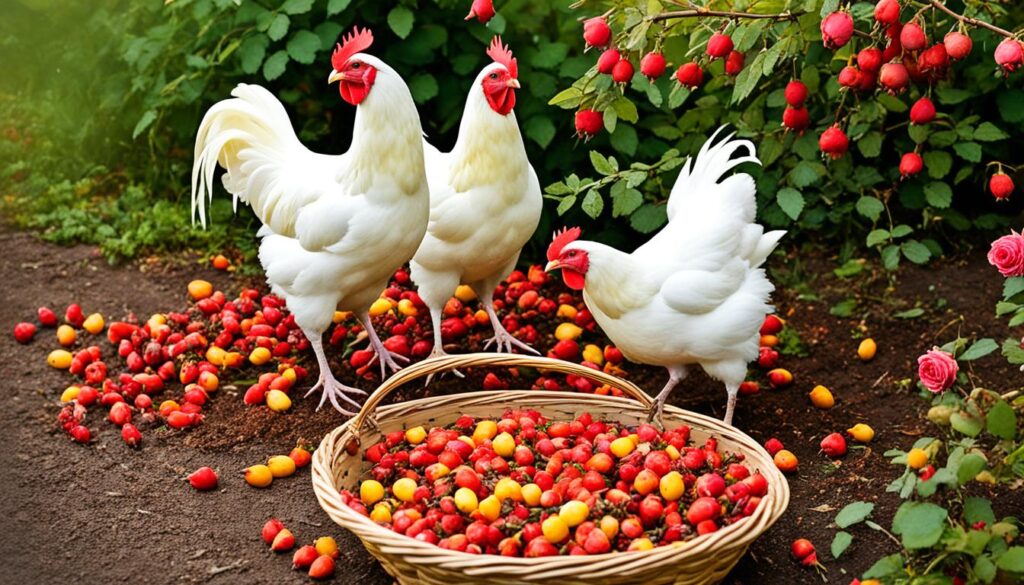
“Rose hips are known to contain high levels of natural antioxidants and vitamins, with concentrations that surpass those found in fruits like blueberries, black currants, hawthorn berry, chokeberry, or rowanberry.”
can chickens eat roses
Roses are a favorite in gardens, and chickens can enjoy them too. Chickens can eat rose petals if they haven’t been sprayed with harmful chemicals. But, rose petals are mostly water, so they don’t offer much nutrition.
Some roses, especially the darker and more fragrant ones, might attract your chickens. While rose petals are safe, the real perk is giving them rose hips. Rose hips are full of vitamin C and antioxidants, which are great for your chickens.
If you want to give roses to your chickens, take the petals off and dry them for later. Adding dried rose petals, along with other flowers and herbs, can be a tasty and healthy treat. Just remember to skip any sprayed rose bushes, as their safety for chickens is not clear.
“Roses are a beloved garden staple, but did you know that your feathered flock can enjoy them too?”
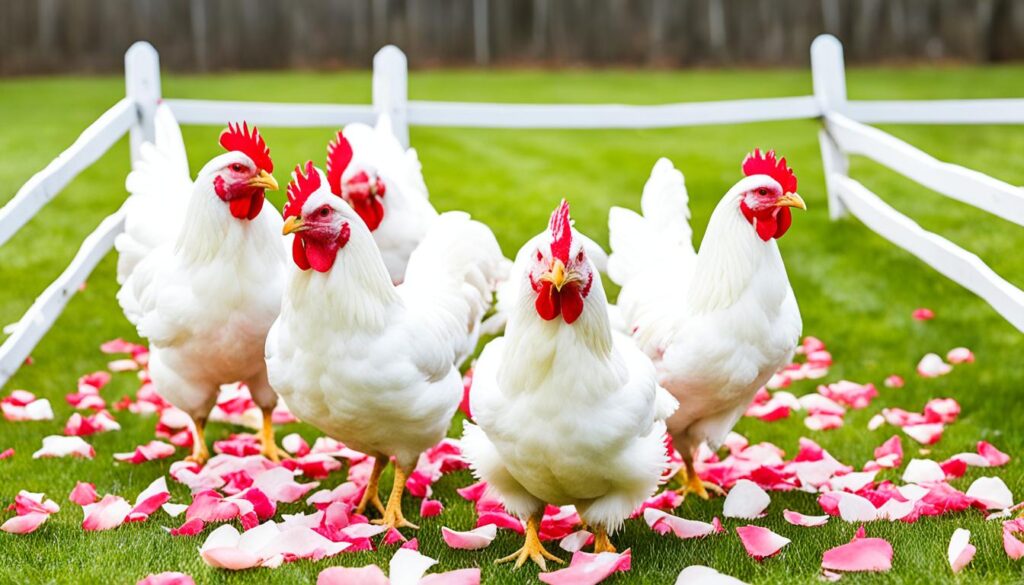
Variety Matters
Not all roses are the same for your chickens. Darker, more fragrant roses might draw your flock in with their rich color and smell. But the real nutritional boost comes from rose hips, full of vitamin C and antioxidants.
So, while chickens can eat rose petals, don’t forget to give them rose hips too. This way, they get the most health benefits.
Other Edible Flowers for Chickens
Your chickens can enjoy many nutritious edible flowers besides rose hips. Marigolds make eggs bright yellow and are full of antioxidants. Sunflowers give them protein and essential oils they love.
There are many safe and helpful flowers for your chicken’s diet. Think about adding nasturtiums, squash blossoms, violets, bee balm, dandelions, clover blossoms, and echinacea. These flowers are full of nutrients and keep pests away, helping your flock stay healthy.
Nutritious Options Like Marigolds and Sunflowers
Marigolds are packed with carotenoids, flavonoids, and lutein. These help fight inflammation and support skin and blood vessel health. Sunflowers give your chickens a protein-rich and essential oil treat they’ll enjoy.
- Marigolds: Promote bright egg yolks and offer antioxidant benefits
- Sunflowers: Provide protein and essential oils for your chickens
- Nasturtiums, squash blossoms, violets, bee balm, dandelions, clover blossoms, and echinacea: Safe and beneficial flowers that support overall flock health
When adding new edible flowers to your chickens, make sure they’re safe and okay to eat. Mixing in different nutritious flowers can make your chickens healthier and happier.
Conclusion
Chickens can safely eat many edible flowers and plants. Rose hips are great for them because they’re full of vitamin C and antioxidants. These can help keep their immune system strong, especially when it’s cold.
But rose hips aren’t the only good choice. Chickens can also enjoy marigolds and sunflowers. These plants give them vitamins, minerals, and antioxidants. Just make sure the plants are free from harmful chemicals and given in small amounts to prevent stomach problems.
By letting your chickens forage and giving them a varied diet, you help them stay healthy. You also make your backyard flock more enjoyable and sustainable. With some research and care, you can give your chickens tasty and healthy treats from your garden.
FAQ
Can chickens eat roses?
Yes, chickens can eat rose petals if they haven’t been sprayed with chemicals. But, rose petals are mostly water, so they don’t give much nutrition. Darker, aromatic roses might be more tasty for chickens.
Rose petals are safe for chickens, but rose hips are better for them. Rose hips are packed with nutrients.
What are the benefits of feeding rose hips to chickens?
Rose hips are full of vitamin C, which is great for chickens. They also have vitamins A, B, E, and K, and minerals. This helps boost the chicken’s immune system, especially in cold weather.
Feeding rose hips can cut down on stress and make chickens more efficient eaters in winter.
How do I select and prepare rose hips for feeding to my chickens?
Choose “Rosa rugosa” or “Rosa canina” for the best rose hips. These types have bigger, sweeter hips. Pick them after the first autumn frost when they’re bright red and soft.
To prepare, dry the hips whole. Spread them out to air dry or use a low temperature dehydrator. This makes them easier for chickens to eat.
What other edible flowers can I feed my chickens?
Chickens can also enjoy many other edible flowers. Marigolds make eggs bright yellow and are full of antioxidants. Sunflowers give them protein and important oils.
Other good flowers include nasturtiums, squash blossoms, violets, bee balm, dandelions, clover blossoms, and echinacea. These flowers are nutritious and help keep pests away, supporting the chickens’ health.

